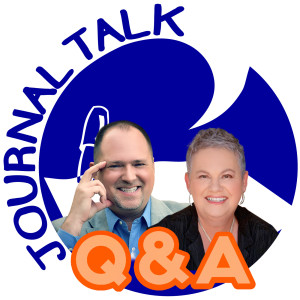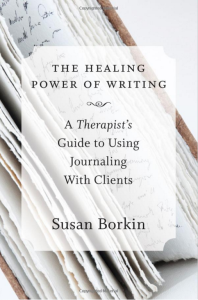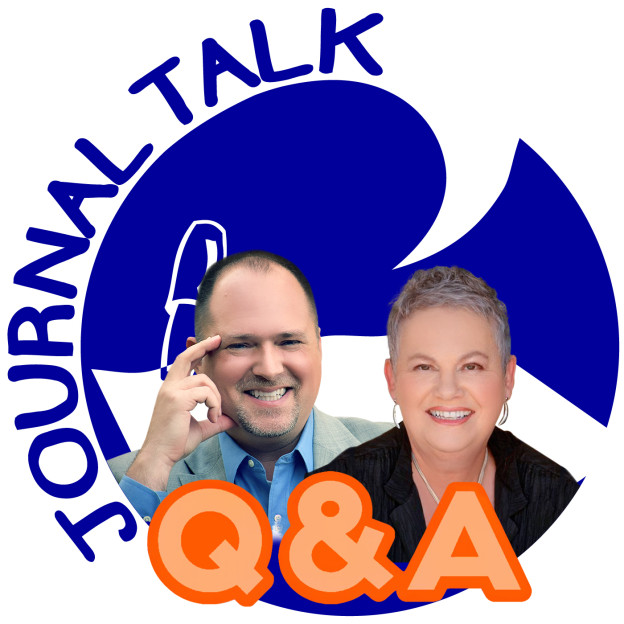Podcast: Play in new window
Subscribe: Apple Podcasts | RSS
 Susan Borkin joins me once again, to share a therapist’s viewpoint on the journal-writing benefit of improved self-esteem, and walk us through a few tips from her book, The Healing Power of Writing.
Susan Borkin joins me once again, to share a therapist’s viewpoint on the journal-writing benefit of improved self-esteem, and walk us through a few tips from her book, The Healing Power of Writing.
Maybe it’s a generational thing, but I don’t seem to hear about the importance of a positive self-image anymore. When I was growing up in the late 70’s and 80’s, all the top motivational speakers spent their time convincing teenagers that the key to any worthwhile accomplishment was a firm, inner belief in themselves. Today, the concept is not quite lost, but it certainly has its share of competing messages.
Susan and I describe some specific writing exercises that can “train your brain” to appreciate your strengths and forgive your weaknesses.
 Your turn to answer: Have you found that journaling helps strengthen your friendship with yourself? When you use your journal-writing to “look in the mirror,” do you see someone valuable and lovable looking back? Post your responses in the comments section at the bottom of this webpage, or join the fans, followers and friends in the JournalTalk community, to share your unique perspective and tips regarding the question-of-the-week.
Your turn to answer: Have you found that journaling helps strengthen your friendship with yourself? When you use your journal-writing to “look in the mirror,” do you see someone valuable and lovable looking back? Post your responses in the comments section at the bottom of this webpage, or join the fans, followers and friends in the JournalTalk community, to share your unique perspective and tips regarding the question-of-the-week.
You may email your own journaling question to be featured on a future episode of JournalTalk. Or, pick up the telephone and leave a voicemail with your question at 1-805-751-6280. When your question is featured, we will send you a thank-you gift for sharing your voice! (JournalTalk Q&A, Episode #44, May 10, 2016)
To Subscribe to JournalTalk:
By email: Click here.
Apple/iPhone/iTunes: Click here.
Now Available on Google Play Music: Click here.
For Coaching with Nathan Ohren: Click here.
To Join the JournalTalk Community on Facebook: Click here.
To Listen to this week’s JournalTalk: Click on the “play” button > at the top of this page.


Hello Nathan and Susan,
thank you for sharing your lovely conversation. I really enjoyed Susan’s take on “Three Things +” and Nathan’s “Qualities I Admire”. It is very heartwarming for me to see that this idea of enabling people to feel the authorship of their own lives, to experience personal agency – ability to influence one’s own life – is so much present in different approaches to journaling.
I would like to add to the list of journaling exercises that help people feel better about themselves one more, that is, essentially, the map of re-membering, developed by Michael White, one of the founders of narrative therapy (and slightly modified by me). This is how it can be transposed into writing prompts:
1. List 3 things you do well – however mundane these could be. Maybe these are three things you did well in a recent situation that posed a challenge for you – but you did well, in the end.
2. You weren’t born being able to do these things, let’s take that for granted. You learned them from someone – somebody taught you. Who was it? Who taught you things that you can do well?
Say, I can write in English moderately well – who taught me? My mother found me a tutor when I was four.
3. This might come across as an unexpected question: What did that person see in you that made them feel you were worthy of teaching?
Probably my mom saw that I was a bright kid that needed intellectual stimulation – a kid with abilities that would benefit from the extra opportunities that knowing a foreign language would give. Maybe she saw that I was eager to learn, curious and mature enough to handle classes.
4. How do the qualities that somebody who deemed you worthy in the past, see in you, are alive and/or transformed in your life now?
in my example, In which ways am I still a curious bright kid at my 36 years of age? What extra intellectual stimulation might open new opportunities for me now?
5. Coming back to the person that deemed you worthy of teaching, why do you think it was important for them personally to share this knowledge? How did it fit in the way they wanted to live, wanted to see themselves, wanted to respect themselves for? What were the skills that they employed in sharing their knowledge?
In my example: my mother did not know English well enough to teach me, but she found me a tutor – why? What was important for her to do to be and feel like a good mother? What were her dreams? What were her skills in noticing what was about me that made me worth teaching? What were her skills in finding the tutor and funding the lessons?
6. Do you find similar dreams, values and skills in your life? Where? What comes to you easily, and what requires more effort and learning?
In my example: do I share my mother’s dreams and values in parenting? How?
7. Do you know anyone else who shares the same values and dreams? Somebody who could celebrate with you the things in parenting that you do well? Somebody who could support you in learning the things that do not come easily to you?
This exercise works not only to “boost self-esteem”, but also to strengthen the sense of connection and belonging; in some ways, it is about transcendence of the individual self.